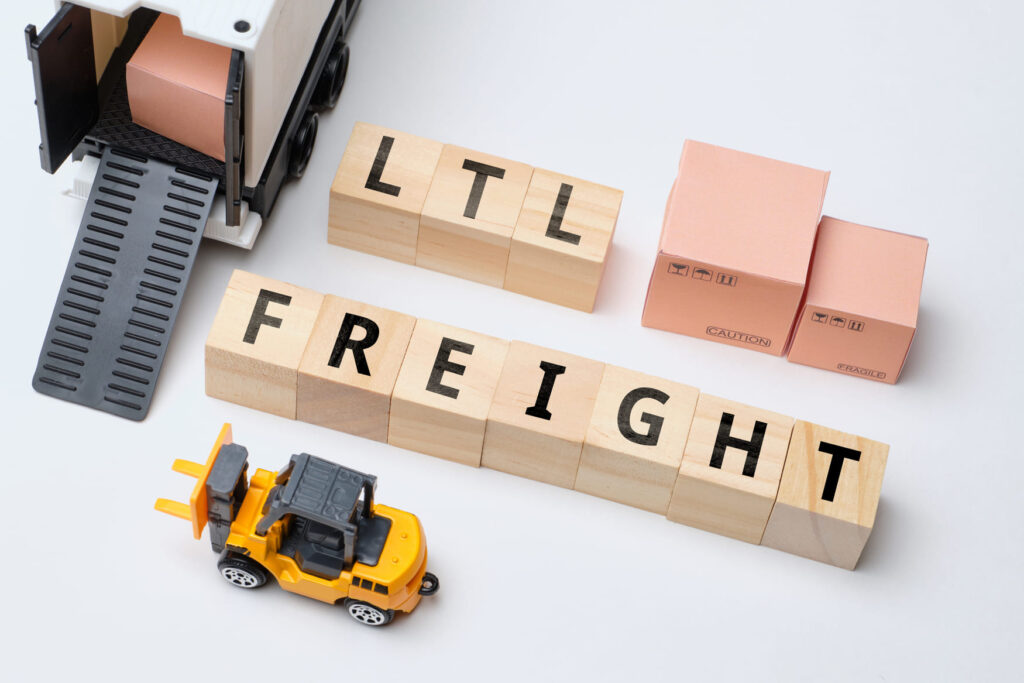Simplify LTL Freight Shipping: 5 Challenges Solved by 3PL

LTL (less-than-truckload) shipping lets businesses move freight that’s too large for parcel carriers but doesn’t fill an entire truck. In this model, multiple shippers combine smaller shipments into one trailer, saving on per-unit costs. For example, LTL freight shipping lets a small e-commerce retailer send pallets without booking a full truck. However, many shippers note LTL can be “slow, expensive, and more likely to damage your freight”. In practice, LTL freight shippers often face delays, unexpected fees and limited visibility. Below we explore five common LTL shipping pain points and show how an experienced 3PL partner uses consolidation, technology and carrier expertise to solve each one.
Freight Delays & Unreliable Transit Times in LTL Shipping
LTL shipments typically travel via hub-and-spoke networks rather than direct routes. This means each pallet may be unloaded and reloaded at terminals along the way. Every transfer adds risk: a traffic jam or missed connection can add a day or more to delivery. In fact, LTL carriers usually give only estimated delivery dates, not guarantees. Time-sensitive cargo – such as perishable goods – can spoil if a delay pushes delivery beyond schedule.
How 3PLs Help: A skilled 3PL mitigates LTL delays by leveraging carrier data and relationships. They match each lane with the most reliable carrier and can book guaranteed services when needed. If a pickup falls through or weather disrupts a route, the 3PL quickly pivots – arranging an alternate carrier or expedited transit. In short, a 3PL proactively plans around LTL’s unpredictability, ensuring your shipments stay on schedule.
2. Damage or Loss of LTL Freight
Because LTL trailers carry freight from multiple shippers, each pallet is handled many times en route. This extra handling means LTL freight sees more touchpoints than a full truckload, raising the chance of damage or loss. Industry data show about 1–2% of LTL shipments incur damage or loss, roughly higher than in full truckload. Fragile or stacked pallets can shift or crush one another, and any break in the cold chain can spoil temperature-sensitive loads.
How 3PLs Help: 3PLs work to protect your freight before it ships. They recommend proper packaging and palletizing, heavy items on bottom, shrink-wrap and corner protectors for fragile goods, to withstand transit. They may also consolidate multiple small loads in a warehouse or use regional carriers with fewer stops to minimize handling. In fact, dedicated freight consolidation (combining orders into one load) keeps your freight on as few trucks as possible, greatly reduces freight claims and inventory shrinkage. If damage does occur, the 3PL handles the claims paperwork and mediation, often speeding up reimbursement so your cash flow isn’t stalled. In this way, a 3PL adds an extra layer of protection and service to your LTL freight.
3. Complex LTL Pricing & Hidden Fees
LTL pricing involves many variables – weight, dimensions, distance, freight class, and more. On top of the base rate, carriers tack on accessorial fees for special services: liftgate delivery, inside delivery, limited-access locations, or redelivery, to name a few. If a shipper fails to disclose a needed service or underestimates weight, the final invoice can skyrocket. In practice, surprise charges are common – one report finds 15–65% of LTL invoices contain billing errors or unquoted fees. This complexity makes budgeting hard and can leave shippers with sticker shock.
- Common hidden fees include:
- Fuel surcharges and holiday/weekend delivery fees
- Liftgate service or inside delivery charges (for non-dock shipments)
- Redelivery or re-consignment fees (if a truck misses the first appointment)
How 3PLs Help: A veteran 3PL acts as your pricing expert. They verify all details of your freight – accurate dimensions, commodity class and required services – so quotes are precise upfront. Then they shop your shipment across multiple LTL carriers to secure competitive rates tailored to your needs. Because 3PLs aggregate volume, they often obtain bulk discounts individual shippers can’t. Importantly, they also audit every freight invoice before payment, catching errors or unjustified charges. By simplifying this process, a 3PL ensures you see the true cost of each LTL shipment and shields you from most surprises.
4. Limited Tracking & Visibility in LTL Shipping
Tracking an LTL pallet can be frustratingly opaque. Many LTL carriers only provide terminal-to-terminal scans, so you might see that your shipment left City A and arrived in City B, but nothing in between. Your cargo may switch trucks at several hubs without real-time updates, leaving you guessing about its whereabouts. This limited visibility complicates planning – you can’t inform customers of precise ETAs or adjust schedules if a delay strikes.
How 3PLs Help: 3PLs invest in technology and partnerships to give you end-to-end visibility. Through a transportation management system (TMS) or dashboard, you can see updates from all carriers in one place. Many 3PLs integrate directly with carrier systems or use GPS tracking to provide real-time location info. Beyond software, the 3PL’s operations team actively monitors your shipments: if an exception occurs, they notify you immediately and work on a fix. The result is that LTL freight becomes nearly as transparent as a dedicated full truckload, letting you keep customers informed and plan around any changes.
5. LTL Accessorial Fees, Missed Pickups & Carrier Issues
Two other common headaches are surprise accessorial fees and occasional missed pickups. As noted above, failing to book a service upfront means carriers will bill it later. Meanwhile, capacity shortages or peak-season surges can lead to carriers skipping scheduled pickups. A missed pickup not only delays delivery, it can incur overtime or rebooking fees if you scramble to reschedule. Adding to this, the LTL market itself is changing: in recent years many smaller LTL carriers have closed or merged, and regional service gaps (embargoes) can appear with little notice. These factors together make carrier reliability a moving target.
How 3PLs Help: A responsive 3PL removes these surprises. When you book, they’ll ask all the right questions: Will a forklift or liftgate be needed? What are the pickup/delivery windows? Any special handling? By capturing those details, the quoted rate already includes needed services, so you won’t see late invoices for them. Experienced 3PLs also negotiate with carriers – for example, they may consolidate shipments to avoid multiple minimum charges. For pickups, the 3PL confirms appointments and tracks carrier performance. If a truck can’t make it, your 3PL immediately taps its network to dispatch an alternate carrier, keeping the delay to a minimum. In essence, working with a 3PL means far fewer billing surprises and quick backup solutions when things go awry.
Streamlining LTL Shipping with 3PL Expertise

LTL freight shipping need not be a constant headache. By partnering with a good 3PL, you get built-in expertise, technology and carrier networks that turn each LTL pain point into a managed process. For example, strategic freight consolidation – merging multiple small loads into a single truck – lowers per-unit cost and handling. A 3PL also provides competitive LTL rates (thanks to volume discounts) and end-to-end tracking so you always know where shipments are. They handle billing audits, claims and re-routing as needed. In short, outsourcing to a skilled 3PL makes LTL freight as easy as having a dedicated truck: your shipments move on time, stay protected, and incur fewer surprises.
Whether you’re a small shipper or a large enterprise, the right 3PL partner allows you to reap LTL’s cost-saving benefits without the common pitfalls. By simplifying complexities – from transit delays and damage to pricing confusion and hidden fees – a 3PL keeps your LTL freight shipping running smoothly so you can focus on what matters most: your business.
You may be interested in

Full Truckload (FTL) Shipping Services: How It Works, Costs & Use Cases
Full truckload shipping (FTL) is a freight transport mode where one shipper’s cargo occupies an entire truck trailer. In FTL service – also known as FTL trucking or full truckload freight transport – a carrier dedicates a 48′ or 53′ trailer exclusively to one shipment. Unlike less-than-truckload (LTL) shipping (where freight from multiple shippers shares […]

Third-Party Logistics (3PL) Warehousing and Distribution: Process and Tips
Ecommerce businesses rely on trusted partners to manage inventory and fulfill sales, with 3PL Warehousing and Distribution providers being key players in the process. A 3PL partner takes charge of essential supply chain operations such as inventory storage, order fulfillment, and shipping, allowing businesses to focus on what they do best. Effective logistics management is […]

Best 3PL Warehouse for Your TikTok Shop Fulfillment
TikTok Shop sellers often face sudden viral demand. A specialized 3PL (third-party logistics) partner helps by handling warehousing, order picking, packing, shipping, and returns. This article explains why TikTok sellers need dedicated TikTok fulfillment services and what features to look for in a TikTok fulfillment center. Why TikTok Sellers Need a Specialized 3PL Fulfillment Company […]
Ready to streamline your warehousing needs?
Request a quote today and discover how OLIMP's tailored solutions can optimize your operations